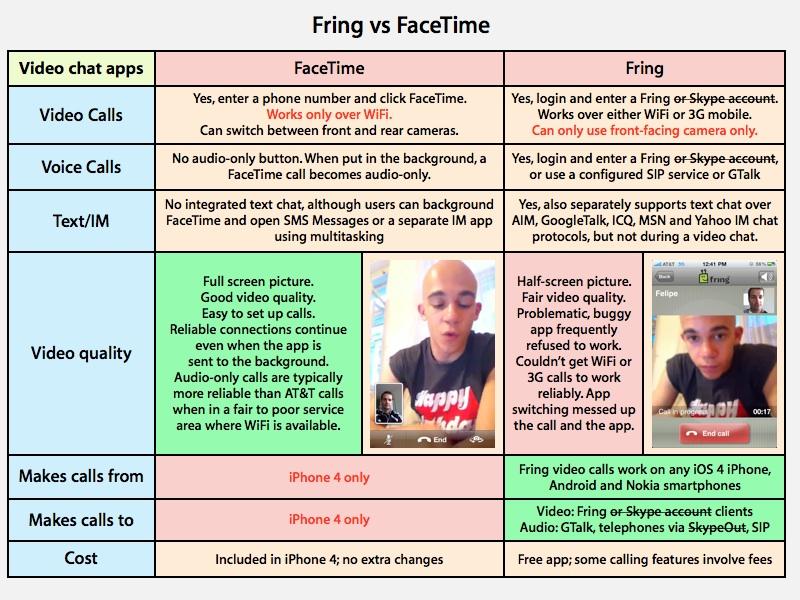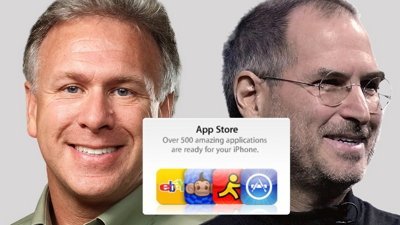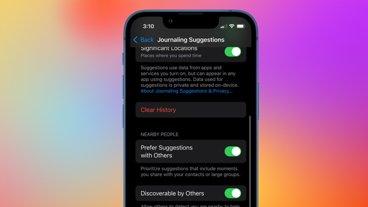War between Fring and Skype boosts Apple's Facetime
Shortly after updating its Fring app to enable video calls for iPhone users running iOS 4 last week, the Israeli startup behind the IM and VoIP client announced that it needed to "temporally reduce support" in Fring for making calls to Skype accounts, indicating that users would now only be able to initiate video calls to other Fring accounts.
Today, Fring claimed on its website that Skype was "cowardly" blocking its app from using the Skype network, writing "They are afraid of open mobile communication. Cowards. Needless to say, we are very disappointed that Skype, who once championed the cause of openness is now trying to muzzle competition, even at the expense of its own users. We’re sorry for the inconvenience Skype has caused you."
Skype responded on its own official blog that "Fring was using Skype software in a way it wasn’t designed to be used – and in a way which is in breach of Skype’s API Terms of Use and End User License Agreement."
Battle affects all mobiles
While dominating the consumer video chat and Voice over IP market with its desktop software, Skype isn't yet offering video chat in its official Skype mobile app, which currently only handles voice calls.
Skype distributes apps for iPhone, select Nokia and Sony Ericsson smartphones, and for Verizon BlackBerry and Verizon "Droid" branded Android phones (which Skype distributes through Verizon as part of an exclusive marketing deal that prevents other BlackBerry and Android phone users on other carriers from being able to use Skype at all).
Fring entered the market with a full featured chat client that piggybacks on Skype's network, and began offering its app to Android, Symbian and iPhone users. Fring's own network doesn't seem to work very well, but users reported better success in connecting to desktop Skype users. However, the massive influx of traffic from iPhone users trying out Fring brought that system down entirely, prompting the squabble between Fring and Skype that resulted in Android users losing their Fring to Skype functionality as well.
As it stands, users with Fring can now only place video calls with other Fring users; iPhone and Verizon Droid users can use the official Skype app to connect to other mobile and desktop users, but only in voice chats; and other Android users, including Sprint's EVO 4G, can't use Skype for voice nor can they any longer use Fring to activate their front facing camera to do video chats with Skype users.
On page 2 of 2: Market for mobile video open to FaceTime.
Whether Skype will open up its popular but proprietary VoIP network to mobile video calls anytime soon remains unanswered. That leaves mobile users either tied to Fring's own problematic network or an app like Android's Qik, which supports live streaming between mobile users, but only on that platform.
Apple's FaceTime video calling feature is similarly only available to iPhone 4 users right now, and currently requires WiFi to work. That networking limitation is proving to be a boon to adoption however, because the greater bandwidth of WiFi results in far higher call quality while also divorcing the feature from dependancies related to mobile carriers, including additional usage fees, regional calling limits, and network connectivity and latency problems.
By making FaceTime simple and easy to use, Apple is reintroducing users to video calls, something that isn't new but hasn't ever caught on with the public at large, much the same way as its iPad succeeded among the failures of tablet computers. Apple's new series of tearjerker commercials is capitalizing on FaceTime as a way to intimately connect with loved ones, establishing it as a primary feature of iPhone 4.
However, Apple has also already committed to making its FaceTime portfolio of technologies an open specification that any device maker and platform vendor can implement, which should result in an explosion of mobile devices capable of video chat without needing a mobile provider or an account with a proprietary VoIP service.
Unlike Skype, FaceTime places calls directly between two parties. Unlike a mobile carrier's 3GPP video calling features (which use circuit switched networks), FaceTime uses the packet switched public Internet, opening up the potential for compatibility with video chat clients on desktop computers. FaceTime is built upon a series of IETF standards that are already in wide use, and works very similar to Apple's iChat AV program.
Open software standards, premium hardware
Apple's strategy with FaceTime appears to mirror its efforts in promoting and advancing HTML5 via WebKit, which has resulted in a new generation of desktop and mobile browsers that don't need proprietary plugins like Adobe Flash and Microsoft Silverlight just to present video clips or dynamic, interactive web content. That has enabled Apple to introduce the Mac, iPhone, iPod touch and iPad with competitive and even leading browser features.
The effort is also similar to Apple's support for the ISO's MPEG MP3 and AAC audio formats over proprietary audio codecs like Sony's ATRAC and Microsoft's Windows Media Audio, a move which helped establish the iPod as open, interoperable, and not dependent upon a specialized proprietary audio format from Apple.
The company is now doing the same thing in video, pushing the ISO's MPEG H.264 codec standards as a capable, jointly licensed and interoperable specification over the use of either low quality or proprietary video formats that only address a single use case, such as Ogg Theora, Flash video, or Google's VP8 for web-centric video.
Whether Skype will ever embrace FaceTime is doubtful, as the value of Skype's network comes largely from being a closed system it can sell to users and license to partners. At the same time, Skype hasn't yet mounted a public relations assault on Apple that claims the company is "limiting choice" by its choosing to support a single, superior open standard.
That has been the route taken by Microsoft with PlaysForSure, Adobe with Flash, Mozilla with Ogg Theora and Google with VP8. In each case, the complaints against Apple have drawn a lot of attention from the media but have not proven to be successful in actually stopping Apple from promoting open standards and selling the hardware that takes best advantage of them.
 Daniel Eran Dilger
Daniel Eran Dilger











 Chip Loder
Chip Loder
 Andrew Orr
Andrew Orr
 Christine McKee
Christine McKee
 Marko Zivkovic
Marko Zivkovic

 Mike Wuerthele
Mike Wuerthele
 William Gallagher
William Gallagher







